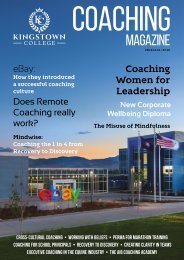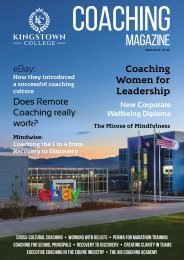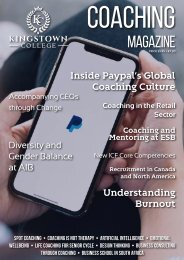Kingstown College Coaching Magazine vol.5 2019/2020
Welcome to another information filled publication of our Coaching Magazine!
Welcome to another information filled publication of our Coaching Magazine!
- No tags were found...
You also want an ePaper? Increase the reach of your titles
YUMPU automatically turns print PDFs into web optimized ePapers that Google loves.
72 Coaching Magazine Vol.5
• Players are encouraged to focus
on what they want to achieve and
on how to do so. Mentoring is not
the same as counselling; players
shouldn’t expect a shoulder to cry on.
• Mentoring relationships cannot
answer or solve all questions or
issues for a player. It is important that
the player is realistic about what can
be achieved; this is why setting goals
at the outset is so important.
Key learning outcomes
Supply versus demand. One of the
key challenges since the mentoring
programme was established has been
managing supply versus demand.
When the IoD sought expressions of
interest from its members to join the
mentoring programme, it was heavily
oversubscribed in all provinces. A
broad mix of skills, expertise and
backgrounds was created on provincial
panels in order to meet the needs of a
diverse player base. Once three panels
were established – approximately
90 IoD members in total – supplyversus-demand
issues continued, as
the mentors involved outnumbered
players.
Managing expectations. One of the
key challenges in the process has
been managing expectations on both
sides. From a mentor perspective, all
have been enthusiastic and keen to
get involved; however, as outlined
below, not all players are ready
for a formal/ structured mentoring
relationship. Facilitating networking
and connections between players and
mentors has been far more beneficial
and has enabled relationships to form
organically. Expectations were perhaps
overly ambitious at the outset, and
through trial and error the programme
is finding the right balance to create
fruitful and worthwhile interactions
between players and mentors.
Real need. Unless there is a real need
from a player for a mentor, the player will
disengage. Networking events, where
players and prospective mentors mingle,
tend to result in a better introduction
to the concept of mentoring; pairings
cannot necessarily be forced.
Scheduling. As the players train
practically daily, and mentors generally
work full-time in business, making time
to meet can be challenging, especially
for national-level players and extremely
busy or self-employed/ entrepreneurial
mentors.
Time. It takes time to build a relationship.
Players may not immediately appreciate
the time and attention that the mentor
has given to the process.
Lack of understanding/clarity. Some
players have suggested that they are unsure
of what is expected of them in a mentoring
relationship. They have a sense that it is good
for their off-field development but don’t
really know why. Often the players meet a
mentor once or twice but then the process
stalls as both player and mentor waited for
the other to get in touch.
Future career. Some players have an idea of
what they want to do, but most don’t have
a very clear path in their minds, so they are
reluctant to engage with a mentor as they
feel they might be wasting the mentor’s time.
Possible over management. There may have
been a perception that there was a greater need
from players – and a less formalized approach,
where a player comes with a specific need or
question, or perhaps is looking for some work
experience or internship, has fostered better
engagement between players and mentors.
There needs to be understanding by mentors,
too, i.e. although they have signed up and
are ready to devote their time to becoming
mentors, they may not be called upon (as there
is only a limited number of players) and that this
is no reflection on their experience, qualification
or skill set.
Case studies
Player 1 experience
I suppose some of the challenges for
athletes is obviously the serious injuries
that you as a player can receive in the
game. Also I think knowing and trying
to figure out what you are going to do
after rugby is also a challenge for most
athletes.
My hopes and dreams from a rugby point
of view are to play for Ireland and to
fulfil my full potential as a player before
I retire. Outside rugby it would be to set
up and run a successful business of my
own, be happy and enjoy life.
The fact that I know I will succeed and
get to where I want to go in rugby and
in life if I always work hard enough for
it. And also I believe the set-backs you
receive make you stronger for it.
I believe it’s very important not just to
meet new business people who might
be handy to know in the future but also
it gives you the confidence of how to act
in a real job later in life. Also gets rugby






